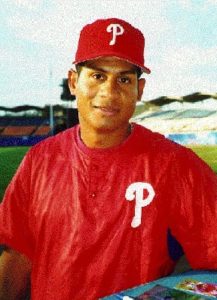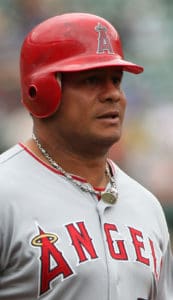Bobby Abreu joins the immortals on the Phillies Wall of Fame
The Phillies are honoring 1998-2006 outfielder Bobby Abreu prior to the game on Saturday night against the Chicago White Sox by enshrining him on the franchise Wall of Fame.
The Phillies are honoring 1998-2006 outfielder Bobby Abreu prior to the game on Saturday night against the Chicago White Sox by enshrining him on the franchise Wall of Fame.
In a special pre-game ceremony, numerous past Wall of Fame honorees are expected to be on hand, including the franchise’ all-time greatest player, Mike Schmidt.
Abreu played in parts of nine seasons with the Phillies from 1998-2006. He is currently 2nd in walks, 4th in doubles, 7th in extra-base hits and stolen bases, 10th in runs scored, 11th in home runs and RBIs, and 14th in hits on the Phillies all-time leader boards.
His .303 career batting average across 1,353 games with the Phillies is the second-highest of any player who has performed with the team over more than half a century, trailing only the .309 mark produced by fellow Wall of Famer John Kruk. His .416 on-base percentage is the fourth-best of any player during their Phillies career, and Abreu’s .928 career OPS with the Phillies is second in franchise history only to the great Hall of Famer and Wall of Famer, Chuck Klein.
Abreu is a native of Venezuela who was signed by the Houston Astros as a 16-year-old amateur free agent in August 1990. He received his first big-league promotion for a 15-game cup of coffee in September 1996.
He appeared twice against the Phillies that month, lining out to center fielder Ricky Otero as a pinch-hitter for Billy Wagner in a 10-8 Phillies victory at the Astrodome on September 11 in his first game against them.
In 1997, Abreu made the team out of spring training, and stayed with Houston through May. He returned for five games in July, and then was called up again in September, appearing in another 14 games. Against the Phillies he went 4-17 with two runs and two RBIs over five games. He would also pinch-hit, going 1-3, in all three games of the Astros sweept at the hands of the Atlanta Braves in the NLDS.
Abreu as a 24-year-old in his first season with the Phillies in 1998.(Roger H. Rangel)
That fall, Major League Baseball expanded to include a pair of new teams, the Arizona Diamondbacks and Tampa Bay Devil Rays (now just “Rays”) and an Expansion Draft was held. Abreu, left unprotected by the Astros, became the sixth player chosen overall, the third by Tampa Bay.
Abreu would never play a single game with those original Devil Rays. In fact, he would never get to the Sunshine State at all. On the same day that he was selected in that draft process, the Phillies traded away shortstop Kevin Stocker to acquire Abreu from Tampa.
Stepping into what was a rebuilding Phillies lineup in the 1998 season, the 24-year-old Abreu made an immediate impact by slashing .312/.409/.497 with 17 home runs, 52 extra-base hits, 74 RBIs, 68 runs scored, and 19 steals.
The following year he received NL MVP votes after leading all of baseball with 11 triples. Abreu slashed .335/.446/.549 with 66 extra-base hits, 118 runs scored, and 27 stolen bases in that 1999 campaign, finishing third in the National League batting race. In 2000, Abreu became the first Phillies outfielder since Greg Luzinski in 1979-80 to produce back-to-back 20-homer seasons.
Abreu remained an impact player over the next few years as the Phillies slowly began to build a contending roster around him. He produced a 30-30 season in 2001 (31 HR/36 SB), led the National League in doubles in 2002, and would drive in over 100 runs in four of five seasons between 2001-05. He would also score 100 or more runs in all but one year between 1999-2005, crossing the plate “only” 99 times in the 2003 season.
In both 2004 and 2005, Abreu was recognized as a National League All-Star. He was awarded the NL Silver Slugger for right fielders following the 2004 season when he banged 30 home runs and 78 extra-base hits, drove in 105 runs, scored 118, and stole 40 bases. On April 12, 2004, Abreu left his mark on Phillies history when he clubbed the first-ever home run at brand new Citizens Bank Park.
At the National League All-Star Game held at Comerica Park in Detroit, Abreu was entered in the Home Run Derby, becoming just the second Phillies player ever selected to participate, following teammate Jim Thome the previous year.
Not only did Abreu participate in that 2005 Home Run Derby, he put on a legendary show, setting what were then records of 24 homers in a single round and 41 overall. Following that 2005 season, Abreu was awarded the National League Gold Glove Award for defensive excellence in right field.
Turning age 32 and with the Phillies looking to get more playing time for emerging 25-year-old outfielder Shane Victorino, Abreu was sent along with pitcher Cory Lidle to the New York Yankees for a package of four prospects at the 2006 MLB trade deadline.
Abreu get to play with the five straight National League East Division champions. And, of course, he wouldn’t be a part of the 2008 Phillies team that won the World Series. But still living in the area in Marlton, New Jersey when Brad Lidge sank to his knees and was piled upon by a number of Abreu’s former teammates on that glorious October night, he and his wife popped a bottle of champagne in celebration all the same.
“I know how hard they worked,” Abreu said per Michael McGarry of the Press of Atlanta City. “I was a part of it. I have Phillies in my heart. I wasn’t there at that moment. But I was at my house celebrating.”
None of the prospects received by the Phillies in that deal ever amounted to anything. Lidle would tragically die in a private plane crash just months later. But Abreu kept on hitting, driving in over 100 runs in that 2006 season, and then again for the Yankees in 2007 and 2008, receiving AL MVP votes in each of those last two seasons.
Just as he wasn’t with the ’08 Phillies champs, Abreu would not be part of the Yankees team that downed the Phillies in the 2009 World Series either. He became a free agent following the 2008 season and signed with the Los Angeles Angels. There, Abreu enjoyed one final 100 RBI season in 2009, and a final 20 homer season in 2010.
While with the Yankees and Angels, Abreu did finally got a lengthy taste of postseason play. He appeared in all eight Yankees ALDS games in both 2007-08, blasting his only-ever playoff home run against Cleveland on October 8. 2007.
Abreu enjoyed his final productive big-league seasons with the Angels from 2009-12. (Keith Allison)
With the Angels he appeared in all three of their 2009 ALDS sweep of the Boston Red Sox, rapping out three hits in the clincher. He then faced his former Yankees team in the ALCS, going just 4-25 with two RBI and falling two wins shy of meeting the Phillies in that 2009 Fall Classic. It would be Abreu’s last appearance in the postseason.
The Angels released him at age 38 in April of 2012. A week later he caught on with the Los Angeles Dodgers, where he was a teammate of Victorino’s on a team that finished in second place in the NL West, two games shy of an NL Wildcard berth.
Abreu sat out the entire 2013 season as he contemplated retirement. But back home he participated in the Venezuelan Winter League and enjoyed success, hitting .322 with Caracas. In January 2014, Abreu signed with the Phillies and went to spring training in Clearwater with his old organization.
The Phillies reunion wouldn’t last. Abreu was released at the end of Grapefruit League play. However, just days later he caught on with the New York Mets. He would appear in just 78 games with the Mets in a final big-league season at age 40, after which Abreu finally hung up the spikes.
In a last hurrah, it would all come full circle for Abreu. His final career at-bat would come against the team that had signed him more than two decades earlier, the Houston Astros. With two outs in the bottom of the 5th inning on Sunday September 28 at Citi Field, Abreu lined a base hit to left off Nick Tropeano. He was pinch-run for by Eric Young, and road off into the baseball sunset.
Abreu becomes the 41st individual enshrined on the Phillies Wall of Fame. He joins former teammates already enshrined on the Wall in Mike Lieberthal (1998-2006), Pat Burrell (2000-06), Curt Schilling (1998-2000) and Thome (2003-05), as well as Larry Bowa and Charlie Manuel, who were two of Abreu’s managers in Philadelphia.
Abreu’s career in a Phillies uniform also overlapped with a number of the 2008 World Series champion Phillies, including Jimmy Rollins (2000-06), Chase Utley (2003-06), Ryan Howard(2004-06) and Cole Hamels (2006), all of whom will one day find themselves enshrined.
There is a chance that Victorino (2005-06), Carlos Ruiz (2006), Ryan Madson (2003-06), Brett Myers (2002-06) or Randy Wolf (1999-2006), all of whom played with Abreu in Philadelphia, could also one day wind up honored on the Wall of Fame.
Bobby Abreu was a key offensive performer during the late-1990’s when the Phillies were a rebuilding National League doormat. He became an All-Star player as the club built a winning roster through the early-mid 2000’s, but was dealt away just as the club was prepared for a long run of division titles.
Abreu should be remembered as the dynamic power-speed combo player that he was in those early years with the Phillies, and for his performance during those tremendous years he is a worthy Wall of Fame enshrinee.
Originally published at Phillies Nation as "Bobby Abreu joins franchise immortals on the Phillies Wall of Fame"




No comments:
Post a Comment